Fortress Press Pauline Studies Bundle (31 vols.)
Digital Logos Edition
Overview
The Fortress Press Pauline Studies Bundle presents 31 volumes of in-depth study on Paul’s works, thought, world, and legacy. You can find biographies, studies on his theology and the current impact of his teaching on modern issues, comparisons of Paul’s teachings with other philosophies, as well as critical literary analyses. You can also explore texts dealing with cultural, geographical, and historical contexts, augmented by helpful maps and charts.
This collection combines the perspectives of over 35 scholars, including some of the most compelling thinking on the life of Paul and the influence of his theology on Christianity and the Western World. Contributors include Neil Elliott. Krister Stendahl, Christiaan Beker, E. P. Sanders, Terence L. Donaldson, and many others. Citing ancient and modern sources and using the latest scholarly methods, this collection allows readers to view Paul in fresh light.
Learn how to apply Paul’s teaching to contemporary preaching, teaching, and spiritual formation. Examine Paul’s relationship to Jewish tradition and thought. Explore this great apostle’s moral reasoning and his mission in Rome’s political context. Analyze Paul’s thought with studies of his views on numerous topics, including missions, the Law, gentile salvation, the Holy Spirit, and Christ’s death, resurrection, and return. This is an invaluable collection for any scholar, professor, or anyone wanting to learn more about the life, teaching, and discussion of Christendom’s most well-known apostle.

- Offers 31 studies of Paul’s life and theology
- Provides input from top Pauline and New Testament scholars
- Contains biographies, comparative texts, and critical literary analyses
- Title: Fortress Press Paul Collection
- Publisher: Fortress Press
- Volumes: 31
- Pages: 7,887
- Approaches to Paul by Magnus Zetterholm
- Reading Romans in Pompeii: Paul’s Letter at Ground Level by Peter Oakes
- Social-Science Commentary on the Letters of Paul by Bruce J. Malina and John J. Pilch
- Liberating Paul: The Justice of God and the Politics of the Apostle by Neil Elliott
- The Arrogance of Nations: Reading Romans in the Shadow of Empire by Neil Elliott
- Christ’s Body in Corinth: The Politics of a Metaphor by Yung Suk Kim
- The Politics of Heaven: Women, Gender, and Empire in the Study of Paul by Joseph A. Marchal
- Galatians Re-Imagined by Brigitte Kahl
- Apostle to the Conquered: Reimagining Paul’s Mission by Davina C. Lopez
- Paul and His World: Interpreting the New Testament in Its Context by Helmut Koester
- The Social Context of Paul’s Ministry: Tentmaking and Apostleship by Ronald F. Hock
- Paul on the Cross by David Brondos
- Paul and the Popular Philosophers by Abraham J. Malherbe
- Cities of Paul, Images and Interpretations: from the Harvard New Testament and Archaeology Project by Helmut Koester
- The Making of Paul: Constructions of the Apostle in Early Christianity by Richard I. Pervo
- Social-Science Commentary on the Book of Acts by Bruce J. Malina and John J. Pilch
- The Challenge of Diversity: The Witness of Paul and the Gospels by David Rhoads
- Conflict and Identity in Romans: The Social Setting of Paul’s Letter by Philip F. Esler
- Final Account: Paul’s Letter to the Romans by Krister Stendahl
- The Influence of the Holy Spirit: The Popular View of the Apostolic Age and the Teaching of the Apostle by Hermann Gunkel
- Paul Among Jews and Gentiles and Other Essays by Krister Stendahl
- Paul: Apostle to the Nations: An Introduction by Walter F. Taylor Jr.
- Paul and the Gentiles: Remapping the Apostle’s Convictional World by Terence L. Donaldson
- Paul the Apostle: The Triumph of God in Life and Thought by J. Christiaan Beker
- Paul, the Law, and the Jewish People by E. P. Sanders
- Paul’s Apocalyptic Gospel: The Coming Triumph of God by J. Christiaan Beker
- The Practice of Hope: Ideology and Intention in 1 Thessalonians by Néstor O. Míguez
- Studying Paul’s Letters: Contemporary Perspectives and Methods by Joseph A. Marchal
- A Theology of the Cross: The Death of Jesus in the Pauline Letters by Charles B. Cousar
- The Triumph of God: The Essence of Paul’s Thought by J. Christiaan Beker
- Walking between the Times: Paul’s Moral Reasoning by J. Paul Sampley
This title is included in the following collections
You can save when you purchase this product as part of a collection.
Fortress Press Pauline Studies...
$706.65$564.99
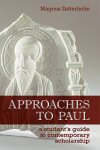
What distinguishes the “new perspective on Paul”—and what lies beyond it? What are scholars saying about Paul and the Roman Empire or about the intersection between feminist and post-colonial interpretation of Paul? Magnus Zetterholm provides a clear and reliable guide to these and other lively issues in the contemporary study of Paul, surveying the history of the principal perspectives on Paul’s relation to Judaism and the Jewish law and showing the relationships between answers given to those questions and the assumptions scholars bring to other issues as well. This is an indispensable handbook for the beginning student of the apostle and his thought.
Zetterholm’s work ought to become standard reading for theological students desiring an introduction to the debate over interpretations of Paul and his Jewish heritage.
—Timothy G. Gombis, associate professor of New Testament, Grand Rapids Theological Seminary, Grand Rapids, MI
Magnus Zetterholm is associate professor of New Testament studies at Lund University, Sweden.
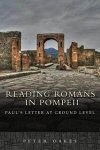
Peter Oakes relies on demographic information and data from excavations in nearby Pompeii to paint a compelling portrait of daily life in a typical insula, or apartment complex, like the ones in which Paul’s audience in Rome likely lived. Imaginatively fleshing out profiles of the circumstances of actual residents of Pompeii, Oakes then uses these profiles to invite the reader into a new way to hear Paul’s letter to the Romans as the apostle’s contemporaries might have heard it. The result of this ground-breaking study is a fuller, richer appreciation of Paul’s most important letter.
Peter Oakes is Greenwood lecturer in New Testament at the University of Manchester.
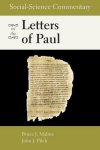
This latest addition to the Fortress Social-Science Commentaries on New Testament writings illuminates the values, perceptions, and social codes of the Mediterranean culture that shaped Paul and his interactions—both harmonious and conflicted—with others. Bruce Malina and John Pilch add new dimensions to our understanding of the apostle as a social change agent, his co-workers as innovators, and his gospel as an assertion of the honor of the God of Israel.
If you are tired of reading the same ‘new’ book on Paul over and over, this commentary on the letters of Paul is the place to go next. In addition to traditional material on rhetoric and background, this social-scientific commentary brings to the fore necessary, significant and enlightening ways of understanding the social role of Paul and his social dynamics with the churches he founded. In this it is unique; it is the only comprehensive social-science reading of Paul. The reading scenarios at the end are themselves worth the price of this book.
—Jerome Neyrey, professor emeritus of New Testament, University of Notre Dame
This is not the typical introspective, individualistic Paul of Western theology. Rather Malina and Pilch reveal Paul as a thoroughgoing Mediterranean person, functioning as a change agent among Israelites living in minority communities around the Greco-Roman world. Pauline theology will never look the same again.
—Richard L. Rohrbaugh, professor of biblical studies, Georgetown University, Washington, DC
Bruce J. Malina is professor of New Testament at Creighton University, Omaha, Nebraska.
John J. Pilch is professor of biblical studies at Georgetown University, Washington, DC.
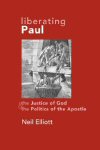
For centuries the apostle Paul has been invoked to justify oppression—whether on behalf of slavery, to enforce unquestioned obedience to the state, to silence women, or to legitimate anti-Semitism. To interpret Paul is thus to set foot on a terrible battleground between spiritual forces. But as Neil Elliott argues, the struggle to liberate human beings from the power of death requires “Liberating Paul” from his enthrallment to that power. In this book, Elliott shows that what many people experience as the scandal of Paul is the unfortunate consequence of the way Paul has usually been read, or rather misread, in the churches.
In the first half of the book, Elliott examines the many texts historically interpreted to support oppression or maintain the status quo. He shows how often Paul’s authentic message has been interpreted in the light of later pseudo-Pauline writings.
In part two, Elliott applies a “political key” to the interpretation of Paul. Though subsequent centuries have turned the cross into a symbol of Christian piety, Elliott forcefully reminds us that in Paul’s time this was the Roman mode of executing rebellious slaves, a fact that has profound political implications.
Under Elliott’s examination, a startlingly new image of Paul begins to emerge, liberated from layers of false interpretation, and free to speak a liberating and challenging word to our world today.
Neil Elliott, an Episcopal priest, teaches biblical studies at United Theological Seminary of the Twin Cities and Metropolitan State University in Minneapolis.
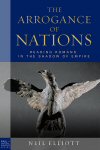
Neil Elliott offers a fresh and surprising reinterpretation of Paul’s letter to the Romans in the context of Roman imperial ideology, bringing to the text the latest insights from classical studies, rhetorical criticism, postcolonial criticism, and people’s history.
By setting the letter alongside Roman texts (Cicero, Virgil, the Res Gestae of Augustus, Seneca, poets from the age of Nero, as well as later historians and satirists), Elliott provides a dramatic new reading of the letter as Paul’s confrontation with the arrogance of empire—and with an emerging Christianity already tempted by the seductive ideology of imperial power. The Arrogance of Nations explores such topics as:
- Empire and the obedience of faith
- Justice and the arrogance of nations
- Mercy and the prerogatives of power
- Piety and the scandal of an irreligious race
- Virtue and the fortunes of peoples
- Paul and the horizon of the possible
A tour de force, The Arrogance of Nations is one of the most thought-provoking books on Paul in years. Making sophisticated use of post-colonial theory while also reading with remarkable exegetical sensitivity, Elliott’s interpretation of Paul as a sharp and subtle critic of empire is cogent, compelling, and a much-needed corrective to the conventional image of the Apostle. Anyone who thinks the discussion of Paul is hackneyed and irrelevant to the issues of our day needs to read this book.
—Pamela Eisenbaum, associate professor of biblical studies and Christian origins, Iliff School of Theology
Elliott demonstrates skillfully and boldly how indispensable the Roman Empire is for interpreting Romans. He synthesizes an impressive array of historical data with wide-ranging political and ideological theory, challenges deceptions on the part of imperial propaganda (ancient and modern) that suppresses the truth, and makes eye-opening correlations with contemporary realities of empire. Even interpreters with different perspectives need to dialogue seriously with this book.
— Robert L. Brawley, professor of New Testament emeritus, McCormick Theological Seminary
This is a remarkable book. A sophisticated practitioner of rhetorical criticism, Neil Elliott also brings to Romans knowledge of Roman imperial ideology and its constraining effects on subject peoples and critical awareness of the imperial ideology and practices of the United States as well. His remarkable analysis makes Romans jump alive as never before. Under Elliott’s discerning eye, Paul’s most important letter becomes a challenge to North Americans’ privileged position as the beneficiaries of empire.
—Richard A. Horsley, distinguished professor of liberal arts and the study of religion, University of Massachusetts, Boston, MA
Neil Elliott, an Episcopal priest, teaches biblical studies at United Theological Seminary of the Twin Cities and Metropolitan State University in Minneapolis.
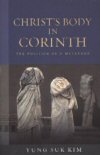
Yung Suk Kim takes up the language of “body” that infuses 1 Corinthians, Paul’s most complicated letter, and the letter that provides us the most information, and poses the sharpest questions, about social realities in the early church. Kim argues against the view that in speaking of the church as Christ’s body Paul seeks to emphasize unity and the social boundary. Against the conventional rhetoric of the “body politic” in Greco-Roman philosophy, Kim argues that Paul seeks rather to nourish the vitality of a diverse community and to criticize the ideology of a powerful in-group in Corinth, a message of particular importance for contemporary global Christianity.
I highly recommend this work to all who take seriously Paul’s metaphor of ‘the body of Christ.’ Kim interprets the metaphor as an alternative vision of vital reconciling community, over against conceptions that emphasize boundary markers to establish social groups. What is at stake in the interpretation of 1 Corinthians, he argues, is not just the ways first-century Christians constructed and lived out social unity but the consequences of our choices for the way we live out our own responsibilities today.
—David Odell-Scott, professor of philosophy, Kent State University
Yung Suk Kim is assistant professor of New Testament and Early Christianity at Samuel DeWitt Proctor School of Theology, Virginia Union University, in Richmond, Virginia.
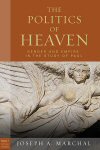
In this provocative study, Joseph A. Marchal argues that biblical interpretation, but most especially Pauline studies, must engage the full range of critical challenges brought by feminist studies, postcolonial studies, and Roman imperial studies. A feminist, postcolonial analysis requires negotiating the gaps, overlaps, and tensions between these three “strands” by adopting an explicitly multi-axial focus and an interdisciplinary methodology. Using Philippians as a test case, the analysis covers issues of both ancient and contemporary import: from imitation and authority to travel and contact. As a result, Marchal provides strikingly new perspectives on Paul’s letters and fresh challenges to the paradigms of Pauline interpretation.
Joseph A. Marchal is assistant professor of religious studies at Grinnell College and the author of numerous articles and papers in feminist and postcolonial interpretation.
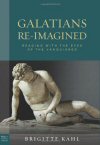
Brigitte Kahl brings to this insightful reading of Galatians a deep knowledge of the classical world and especially of Roman imperial ideology. The first wave of scholarship on the Roman imperial context of Paul’s letters raised important questions that only thorough treatments of individual letters can answer. Kahl sets the letter to the Galatians in the context of Roman perceptions of vanquished peoples as represented in the Great Altar at Pergamum. Beginning with a perceptive discussion of the Great Altar, Kahl describes imperial representations of Roman power as well as the characteristics officially imputed to conquered peoples, including the “savage” Galatians (Gauls).
Brigitte Kahl is professor of New Testament at Union Theological Seminary, New York.
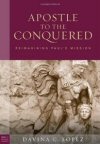
Davina C. Lopez here combines attention to Roman visual and literary representations of conquered nations with a gender-critical “re-imagination” of Paul’s apostleship. The result is a new and more critical perspective on the systematic violence of the Roman Empire, and a renewed understanding of “Paul’s politics of the new creation.”
Davina Lopez has dramatically reframed two enduring themes of Pauline scholarship in this book. Paul’s ‘gentiles’ gain a crucial new theo-political meaning. Gender in Paul’s thought obtains stunning new vistas as well, which reorder the entire debate. With striking visuals from the ancient world and incisive analysis of texts, Lopez joins Brigitte Kahl in recasting Pauline scholarship for the future.
—Hal Taussig, visiting professor of New Testament, Union Theological Seminary, New York
Davina C. Lopez is assistant professor of religious studies at Eckerd College in St. Petersburg, Florida, and serves on the American Academy of Religion’s Board of Directors.
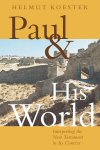
This volume by Helmut Koester presents critical essays on theology and eschatology in Paul’s letters, the apostle’s religious and cultural context, and the interaction of early Christianity with its Greco-Roman environment, as reflected in ancient literature and archaeological remains.
Koester’s monumental volume of essays spans a whole generation of his work on the Pauline letter corpus, the interpretation of Pauline theology, the locations where Paul worked, and the archaeology of these sites, which he has year after year himself examined on site. It is a must for anyone working on Paul and his churches.
—James Robinson, professor of religion emeritus, Claremont Graduate University
Helmut Koester is John H. Morison Research Professor of Divinity and Winn Research Professor of Ecclesiastical History at Harvard Divinity School in Cambridge, Massachusetts, and Chair of the New Testament Board of the Hermeneia Commentary Series.
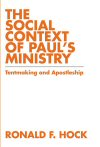
Ronald Hock focuses on the apostle Paul and his work within the social and intellectual context of the Greek East of the early Roman Empire. He discusses the New Testament evidence concerning tentmaking in relation to Paul’s life as an apostle of Christ. Relevant literary and non-literary texts from outside the New Testament add detail to a picture of ancient society and open new areas for study. The author describes the typical experiences that arose from such a way of life—traveling, the tentmaking trade, the missionary use of the workshop, attitudes toward work, and Paul’s own reflections on the significance of his tentmaking for the apostolic self-understanding.
This book is adequately researched and documented for its scope. . . . If the argument presented here is essentially correct, it provides socioeconomic anchorholds for many of the puzzling attitudes expressed by Paul about himself, his work, and his relationship to the communities of his mission.
—The Catholic Biblical Quarterly
Paul’s choice of tentmaking was, Hock argues, not simply a response to the rabbinic ideal of study of Torah combined with labor; it was a conscious act to guard against any possible implication that he was an apostle for gain. . . . This book adds a needed dimension to our understanding of Paul.
—The Christian Century
Scholars and lay readers alike will find valuable information and insights in this ground-breaking investigation of Paul’s tentmaking.
—Journal of Biblical Literature
Ronald F. Hock is professor of religion at the University of Southern California, Los Angeles.
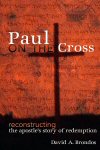
Even as theologians have become more critical of classic theories of atonement, biblical scholars have continued to rely upon such theories as a basis for interpreting Paul’s teaching regarding salvation and the cross. In this vital volume, David Brondos looks to the recent advances in New Testament scholarship to argue for an alternative understanding of Paul’s doctrine of salvation and the cross.
Paul, says Brondos, understood Jesus’ death primarily as the consequence of his mission: to serve as God’s instrument to bring about the long-awaited redemption of Israel, in which Gentiles throughout the world would also be included. For Paul, Jesus’ death is salvific not because it satisfies some necessary condition for human salvation, as most doctrines of the atonement have traditionally maintained, nor because it effects some change in the situation of human beings or the world in general. Rather, Jesus’ God responded to Jesus’ faithfulness unto death by raising him, thereby ensuring that all the divine promises of salvation would be fulfilled through him.
Jesus’ death forms part of an overarching story culminating in the redemption of Israel and the world. It is this story, and in particular what preceded and followed Jesus’ death on the cross, that makes that death redemptive for Paul.
Brondos offers a fresh rereading of the Gospels, Acts, and the Pauline letters that will spur others to reread and rethink these texts. His argument raises significant challenges to those who caricature Paul as the inventor of Christianity, as will as to those who follow the ‘New Perspective on Paul.’ This book will serve as a valuable stimulus for exegetical and theological clarification regarding the atonement, the story of redemption, and the Christian view of time.
—Mark Reasoner, associate professor of biblical studies, Bethel University
David Brondos is professor of theology at the Theological Community of Mexico, an ecumenical consortium of seminaries in Mexico City, where he teaches systematic theology and biblical studies.
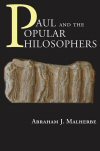
These studies continue a tradition of scholarship that flourished around the turn of the century when new editions of ancient philosophical sources were published. Abraham Malherbe, however, widens the scope to include other philosophical traditions. He recognizes and identifies the influences of Platonists, Peripatetics, Cynics, Stoics, Epicureans, and Pythagoreans. These popular philosophers aimed at moral reform; they shared both in their substance and in the techniques employed. Yet, they need to be distinguished in order to discern their influence, if any, on Paul.
Professor Abraham J. Malherbe has already given us fresh insights to the understanding of Paul’s letters, ones which have been widely accepted. This volume presents the most important of them; Malherbe shows Paul interacting with the philosophical questions and solutions of his day. Indebted to international scholarship stretching back to the beginning of this century, Malherbe here presents his own coherent view of Paul.
—Dieter H. Lührmann, professor of New Testament, Marburg University, Germany
Abraham J. Malherbe is Buckingham Professor of New Testament criticism and interpretation, emeritus, at Yale University, The Divinity School, New Haven, Connecticut.
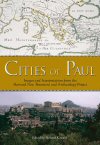
Cities of Paul, Images and Interpretations: from the Harvard New Testament and Archaeology Project
- Author: Helmut Koester
- Publisher: Fortress Press
- Publication Date: 2004
This dynamic resource includes 900 photographs from sites in Greece and Turkey (ancient Asia Minor) illuminating the religious and civic lives of peoples encountered by Paul and other leaders in the earliest churches. Cities featured include Athens, Olympia, Corinth, Pergamon, Delphi, Philippi, Ephesus, and Thessalonike. In addition to photos, this resource includes maps, bibliographies, and detailed historical information about the sites and artifacts.
Each slide is accompanied by an explanation of the image and the particular elements in the photograph. This stunning array of images and commentary is a powerful teaching and reference tool to bring alive the world of the early Christians for students and laypersons alike.
Helmut Koester is John H. Morison Research Professor of Divinity and Winn Research Professor of Ecclesiastical History at Harvard Divinity School in Cambridge, Massachusetts, and Chair of the New Testament Board of the Hermeneia commentary series.
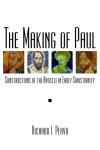
The Making of Paul: Constructions of the Apostle in Early Christianity
- Author: Richard I. Pervo
- Publisher: Fortress Press
- Publication Date: 2010
- Pages: 400
The influence of the apostle Paul in early Christianity goes far beyond the reach of the seven genuine letters he wrote to early assemblies. Paul was revered—and fiercely opposed—in an even larger number of letters penned in his name, and in narratives told about him and against him, that were included in our New Testament and, far more often, treasured and circulated outside it. Richard Pervo provides an illuminating and comprehensive survey of the legacy of Paul and the various ways he was remembered, honored, and vilified in the early churches. Numerous charts and maps introduce the student to the “family” of Pauline and anti-Pauline Christianities.
Richard I. Pervo, retired professor of New Testament and Christian studies at the University of Minnesota, is author of Rethinking the Unity of Luke and Acts, and most recently, Dating Acts: Between the Evangelists and the Apologists.
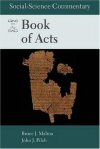
Social-Science Commentary on the Book of Acts
- Author: Bruce J. Malina and John J. Pilch
- Publisher: Fortress Press
- Publication Date: 2008
- Pages: 254
Like earlier volumes in the Social Science Commentary series, this volume situates Acts squarely in the cultural matrix of the first century Mediterranean world, elaborating its codes of patron and client, mediatorship, honor and shame, healing and sickening, wizardry and witchcraft accusations, and the understanding of the spirit of God as well as deities and demons as personal causes of significant events.
Bruce J. Malina is professor of New Testament at Creighton University, Omaha, Nebraska.
John J. Pilch is professor of biblical studies at Georgetown University, Washington, DC.
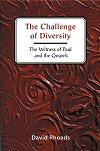
This volume by David Rhoads is addressed primarily to Christians of various denominations in the United States—to parishes, both laity and clergy, and to students. The book is useful in teaching, preaching, spiritual formation, and mission. Its aim is simply to be a source of Christian renewal at both the personal and the parish levels as together we seek to minister to one another and to the world. It is an invitation to reach beyond our own perspective and to embrace a wider circle of diverse viewpoints as legitimate expressions of the Christian life—both in the New Testament and in the contemporary church—and to be open to learn and grow from them.
This book is an excellent introduction to the major ways of being Christian in the New Testament. David Rhoads brings out the richness and diversity of the New Testament in such a way as to help us understand and welcome the richness and diversity in our churches and culture today. The book is both a good introduction to New Testament thought and to ways in which that thought may be meaningful in our own context.
—Joanna Dewey, Harvey H. Guthrie Jr. Professor Emerita of Biblical Studies, Episcopal Divinity School
I love this book! It is an excellent guide for those who wish to draw on the rich resources of Scripture for varieties of mission and ministry in the contemporary world. Students and congregations, clergy and laity, will find that this volume enhances understanding of their own diversity and appreciation for the diversity of others.
—Mark Allan Powell, Robert and Phyllis Leatherman Professor of New Testament, Trinity Lutheran Seminary
The essential point of the Challenge of Diversity is that appreciation of the diversity in Scripture and in the early church is a source of renewal in the church today. . . . The book’s principal strength is its case that church renewal must be grounded in Scripture and that diverse perspectives of particular writings must be honored. In this way Rhoads offers a welcome corrective to reductionist tendencies that gloss over theological and relational tensions within and between biblical books. . . . Rhoads offers a timely and constructive contribution for engaging the challenge of diversity, and those seeking fruitful discussion on this topic will not be disappointed.
—Interpretation
Rhoads’ style is clear and accessible, and his passion for the renewal of the church comes through on every page. This book will prove stimulating reading for pastors, seminarians, and lay persons who are concerned to draw upon the rich resources of the Bible in revitalizing the life and mission of a diverse church in a pluralistic world.
—Princeton Seminary Bulletin
I highly recommend this book for both lay and minister readers and for personal and group study. My first year seminarians in my introductory Gospels course loved it! It evoked lively discussion, helped us experience the Gospels anew, and deepened our appreciation of the profundity and contemporary relevance of diverse New Testament witnesses. It is a book that can help all of us understand and embrace the diversity that is God’s gift to the church and essential to effective mission and ministry.
—The Presbyterian Outlook
David Rhoads is emeritus professor of New Testament at Lutheran School of Theology in Chicago and the author of Reading Mark: Engaging the Gospel, editor of From Every People and Nation: The Book of Revelation in Intercultural Perspective, and coeditor of The Season of Creation: A Preaching Commentary.
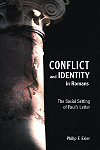
What is the purpose of Paul’s letter to the Romans? Philip Esler provides an illuminating analysis of this epistle, employing social-scientific methods along with epigraphy and archaeology. His conclusion is that the Apostle Paul was attempting to facilitate the resolution of intergroup conflict among the Christ-followers of Rome, especially between Judeans and non-Judeans, and to establish a new identity for them by developing a form of group categorization that subsumes the various groups into a new entity.
Esler provides his readers with a discerning, exciting, and masterful reading of St. Paul’s letter to the Romans. . . . For an incisive, penetrating, and sensible grasp of Romans, there is nothing better than Esler’s work. The unassuming and unostentatious style in which the book is written belies the freshness of insight and brilliance of perception that the author offers his readers.
—Bruce J. Malina, professor of New Testament and early Christianity, Creighton University
This is an important study of Paul’s letter to Rome that breaks out of the traditional boundaries of doctrine interpretation. Employing insights from recent social science, Esler argues that Paul offers the diverse churches in Rome a common in-group identity that could overcome their ethnic conflicts and make cooperation possible. They need to understand that every ethnic group stands equally under sin and under grace. This innovative book makes Romans more important than ever for a world still torn by ethnic conflict.
—Robert Jewett, visiting professor of New Testament, University of Heidelberg
Philip F. Esler is professor of biblical criticism at the University of St. Andrews, Scotland. Among his publications are The Early Christian World, Galatians, and The Early Christians and Their Social Worlds.

Krister Stendahl offers a provocative and compelling reading of Paul’s letter to the Romans, the “final account” of the major themes of Paul’s theology. Among these are the conceptual underpinnings of Paul’s mission, the grand divine plan for the mending of creation, the redemption of Israel, the mystery of the inclusion of the Gentiles, and the relation of the “macro” to the “micro” in Paul’s thought—and much more.
The book is delightful reading, punctuated with humor, yet serious about expounding long-standing traditional interpretations of Paul and of Romans that fly in the face of the text and the spirit of Paul’s intentions.
—Journal of Beliefs and Values
Krister Stendahl (1921–2008) was Andrew W. Mellon Professor of Divinity Emeritus and former dean at Harvard Divinity School, and bishop emeritus of Stockholm. Among his many writings is Paul among Jews and Gentiles.
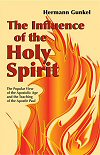
This little book, the first by Hermann Gunkel, shattered the reigning images of the New Testament idea of the Spirit. Gunkel’s argument not only revolutionized the theology of his time but has continued to be foundational for most subsequent studies on the subject. As he did in so much of his work, Gunkel not only explores the milieu of the New Testament but also demonstrates the dependence of the biblical message upon its religious environment.
Hermann Gunkel (late professor of Old Testament at the university in Berlin, Giessen, and Halle, Germany) is one of the most important figures in the history of Old Testament research. He is best known as the founding figure of form criticism and as a member of the History of Religion School.

A sharp challenge to traditional ways of understanding Paul is sounded in this book by a distinguished interpreter of the New Testament. Krister Stendahl proposes—in the key title essay—new ways of exploring Paul’s speech: Paul must be heard as one who speaks of his call rather than conversion, of justification rather than forgiveness, or weakness rather than sin, of love rather than integrity, and in unique rather than universal language.
The title essay is complemented by the landmark paper, “Paul and the Introspective Conscience of the West,” and by two seminal explorations of Pauline issues: “Judgment and Mercy” and “Glossolalia—The New Testament Evidence.” The book concludes with Stendahl’s pointed reply to the eminent scholar Ernst Kasemann who has taken issue with the author’s revolutionary interpretations. This volume provides convincingly new ways for viewing Paul, the most formative of Christian teachers.
An especially important book . . . for all who are interested in the alleged biblical roots of Christian anti-Semitism.
—Worldview
Krister Stendahl (1921–2008) was Andrew W. Mellon Professor of Divinity Emeritus and former dean at Harvard Divinity School, and bishop emeritus of Stockholm. Among his many writings is Final Account: Paul’s Letter to the Romans.
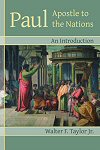
Seemingly from the start, the Apostle Paul has been one of Christianity’s most important—and controversial—figures. In this carefully designed textbook, Walter F. Taylor Jr. sets the apostle in his cultural world, examining his work, his letters, and his legacy in the light of the latest scholarly methods. Paul’s thought never stands alone; careful attention is given to social realities and controversies in Paul’s churches and to rhetorical aspects of his letters. Frequent sidebars illustrate points or offer additional depth; maps, a timeline, and photographs bring the world around Paul to life. Each chapter includes study questions and recommendations for further reading. A glossary of terms and bibliography help the beginning and the advanced student alike.
Professor Taylor has provided a clearly written and highly informative account of Paul’s life, his world, and his letters. The presentation is well organized, comprehensive, and insightful, making the apostle and his work accessible to the reader. The book can be recommended highly for students and others who want a reliable guide to one of the most important figures and collections of New Testament writings at the dawn of Christian origins.
—Arland J. Hultgren, emeritus professor, Luther Seminary, St. Paul, MN
This extremely well-written study combines an effective exposition of Paul’s identity with an effective exposition of Paul’s seven undisputed letters. Professor Taylor is remarkably sensitive to the Roman imperial context of Paul’s ministry and the impact of Paul’s Roman chains upon his letters to the Philippians and to Philemon.
—Richard J. Cassidy, professor of sacred Scripture, Sacred Heart Major Seminary, Detroit, MI
Walter F. Taylor Jr. is the Ernest W. and Edith S. Ogram Professor of New Testament Studies at Trinity Lutheran Seminary and a member of the Context Group, applying social-science models to the study of the New Testament. He is the author of numerous journal articles on the New Testament and of Ephesians, and study resources on Galatians and Romans.
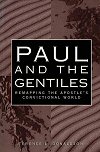
In this first major analysis of Paul’s understanding of Gentile salvation in several years, Terence Donaldson offers a creative approach to the major themes of the apostle’s theological convictions: God, sin, the Torah, Christ, Israel, his own call, and others. According to Donaldson, Paul as a believer in Jesus Christ did not abandon his Jewish frame of reference but reconfigured it, especially by the stimulus of his mission to the Gentiles.
Not since E. P. Sander’s Paul and Palestinian Judaism has there been such a sustained effort to understand Paul by locating him in his native religion, late Second Temple Judaism. Donaldson constructs Paul’s context by looking particularly at ancient evidence, both scriptural and social, as it pertains to Jewish views of and interactions with Gentiles. The result is a breathtakingly ambitious survey and analysis of Jewish thought on ‘the Gentile questions,’ combined with a close reading of the epistles and, consequently, a coherent and plausible reconstruction of Paul’s mission and motives. In this book, Terry Donaldson brings together ancient and modern sources with imagination and conviction to advance his own original hypothesis explaining how this ‘Hebrew of Hebrew’ came to see the incorporation of Gentiles as the logical extension of his commitment to Christ and to the redemption of Israel.
—Paula Fredriksen, William Goodwin Aurelio Chair Emerita of the Appreciation of Scripture, Boston University
Terence Donaldson has pursued one specific question with such methodological rigor as to cast light on many aspects of Paul’s convictions, theology, and rhetorical stance in general. This is an important book.
—Lloyd Gaston, emeritus professor of New Testament, Vancouver School of Theology
Donaldson interacts honestly and incisively with the main lines of thinking that are now current and offers a new dimension of thought that has not yet been presented.
—Scot McKnight, Karl A. Olsson Professor in Religious Studies, North Park University
Terence L. Donaldson is Lord and Lady Coggan Professor of New Testament Studies at Wycliffe College. He is the author of Jesus on the Mountain: A Study in Matthean Theology and Jews and Anti-Judaism in the New Testament.
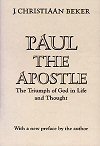
This volume posits two pillars as the foundations of Paul’s thought: one, the interaction between coherence and contingency in Paul’s interpretation of the Gospel, and two, the apocalyptic character of his Gospel.
This theological construction is so imposing that it is likely to become the lightning rod for the next phase of scholarly storms. . . . Both in opening up new solutions to knotty interpretive problems, Paul the Apostle is a major achievement. It should be on the ‘must-read’ list for every serious devotee of the New Testament.
—Theology Today
. . . a full-dress study of Paul’s thought, characterized by comprehensiveness, exegetical discipline, theological penetration, and a passion for a responsible contemporary hermeneutic. . . . It will grace our Pauline shelves for a very long time, not least because readers will sense that the theological passions that raged in the heart and mind of Paul incite a contagious resonance in the heart and mind of the distinguished author.
—Word and World
This book is a serious proposal by a mature scholar. Its specificity will drive others to investigate the breadth of learning it presumes. Its theological concern is candidly accessible on the grounds of historical and exegetical inquiry. It is a welcome contribution to New Testament interpretation.
—Catholic Biblical Quarterly
J. Christiaan Beker was, for 30 years, the Richard J. Dearborn Professor of New Testament Theology at Princeton Theological Seminary; he died in 1999. Among his books are The Triumph of God and The New Testament: A Thematic Introduction.
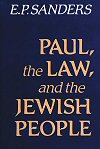
This book is devoted both to the problem of Paul’s view of the Law as a whole, and to his thought about and relation to his fellow Jews. Building upon his previous study, the critically acclaimed Paul and Palestinian Judaism, E. P. Sanders explores Paul’s Jewishness by concentrating on his overall relationship to Jewish tradition and thought. Sanders addresses such topics as Paul’s use of Scripture, the degree to which he was a practicing Jew during his career as apostle to the Gentiles, and his thoughts about his “kin by race” who did not accept Jesus as the Messiah. In short, Paul’s thoughts about the Law and his own people are re-examined with new awareness and great care.
Sanders addresses an important chapter in the history of the emergence of Christianity. Paul’s role in that development—especially in light of Galatians and Romans—is now re-evaluated in a major way. This book is in fact a significant contribution to the study of the emergent normative self-definition in Judaism and Christianity during the first centuries of the Common Era.
E. P. Sanders is emeritus arts and sciences professor of religion at Duke University, Durham, North Carolina. He is the author of Jesus and Judaism, winner of the 1990 Louisville Grawemeyer Award in Religion. Paul and Palestinian Judaism received the 1978 National Religious Book Award, Scholarly Book Category, from Religious Book Review.
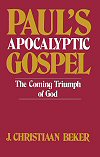
In this bold sequel to Paul the Apostle, celebrated New Testament scholar J. Christiaan Beker reclaimed the apocalyptic center of Paul’s proclamation for the life of the contemporary church.
J. Christiaan Beker faces a major question: can the genuine power of Paul’s truly responsible apocalyptic be recovered in our time—so that we are actually addressed by the gospel of God’s coming cosmic triumph—without falling victim to readily available forms of sheer speculation, paranoid polarization, and romantic futurism? Beker responds to this question with uncommon honesty and insight as he shows that the passion for God’s coming triumph can serve—and in fact does serve—as the generating source of our compassion for our needy world.
—J. Louis Martyn, Edward Robinson Professor Emeritus of Biblical Theology, Union Theological Seminary
The great Christian word hope has fallen on hard times: existential theologians have redefined it as openness to a vague future; Apocalyptic sensationalists have reduced it to a time table of escapism. In his study of Paul’s Apocalyptic Gospel, Beker has recaptured the meaning of hope. To a church fettered to her past or consumed by her present, no perspective is more helpful than Beker’s conclusion that the Gospel embraces the future and that the future’s clearest feature is the victory of God. Preaching will come to life and Bible study take on new vigor for all who walk through Paul’s letters with Beker as a guide.
—David Allan Hubbard, former president, Fuller Theological Seminary
J. Christiaan Beker was, for 30 years, the Richard J. Dearborn Professor of New Testament Theology at Princeton Theological Seminary; he died in 1999. Among his books are the critically acclaimed Paul the Apostle, The Triumph of God, and The New Testament: A Thematic Introduction.
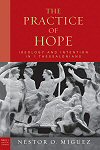
Although the political interpretation of Paul is still considered something of a novelty in North America and Europe, it is well established in Latin America and among theologians of liberation. In The Practice of Hope, Néstor O. Míguez brings the insights of historical-critical study and political analysis together with incisive theological reflection. Taking on European philosophical interpretations of Paul, the “North Atlantic consensus” regarding social stratification in the Pauline churches, and the distortions of “rapture” theology, Míguez situates Paul’s mission in the political context of Roman Thessalonica and reads his first letter in engagement with Latin American realities. The result is a surprising rediscovery of Paul as an organic intellectual for whom hope is always a socially concrete reality.
Néstor O. Míguez is professor of Bible at the Instituto Universitario ISEDET in Buenos Aires and the author of numerous books and articles on the theological and political interpretation of the New Testament, including Juan de Patmos: El Visionario y Su Visión, El Jesús del Pueblo, and with his father José Míguez Bonino, That You May Have Life: Encounters with Jesus in the Gospel of John.
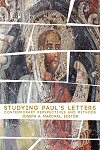
Studying Paul’s Letters provides a survey of the most relevant current methods in Pauline scholarship. Joseph A. Marchal leads a group of scholars who are also experienced teachers in courses on Paul. More than a series of “how-to” essays in interpretation, each chapter in this volume shows how differences in starting point and interpretive decisions shape different ways of understanding Paul. Each teacher-scholar focuses on what a particular method brings to interpretation and applies that method to a text in Paul’s letters, aiming not just at the beginning student but at the “tough choices” every teacher must make in balancing information with critical reflection. Studying Paul’s Letters is organized for use in a single semester course on Paul and is perfect for graduate students, seminarians, and undergraduate students.
The essays in Studying Paul’s Letters, each written by a first-tier scholar, manage to demonstrate cutting-edge Pauline scholarship in ways that remain highly accessible for beginning students. These essays will not only provoke conversation about difference in perspective, but also reveal the multiple ways that seemingly disparate approaches still often intertwine. I can think of no other collection suitable as supplementary readings for students that so effectively unites these various goals.
—Robert Paul Seesengood, assistant professor of religious studies, Albright College
Pauline studies, long the most methodologically monolithic and theologically timid area of New Testament studies, bursts out of its shell with this textbook. I feel I’ve been waiting for it for a very long time.
—Stephen D. Moore, professor of New Testament, Drew Theological School
This is arguably the best and most accessible textbook for a course on reading Paul. This book will help readers learn not only about Paul in particular but also how one might approach the New Testament in general. The latter aspect is especially helpful since it focuses on approaches that are still seldom covered in most textbooks on biblical criticism, like reading from a spatial and a visual perspective. Most importantly, contributors to this volume write as teachers as well as researchers. I will no doubt adopt this book for my next course on Paul.
—Tat-siong Benny Liew, professor of New Testament, Pacific School of Religion
This introduction to Paul’s letters is a surprisingly readable entrée into a spectrum of ideological approaches to interpreting biblical texts. Foregrounding accountability for the results of our engagement with Scripture, each chapter in turn offers a substantive engagement with and challenge to more traditional methods of reading Paul. Perhaps more importantly, any given chapter simultaneously highlights the highly political nature not only of Paul’s letters but also of our interpretations of them. A course on Paul today, whether for the undergraduate or seminary level, would be woefully lacking without this text.
—Jennifer Bird, associate professor of religion, Greensboro College
Joseph A. Marchal is associate professor of religious studies in the department of philosophy and religious studies at Ball State University and the author of The Politics of Heaven: Women, Gender, and Empire in the Study of Paul and a number of journal articles and essays concerning method and approach in interpretation.
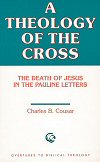
In Paul’s epistles the crucifixion story reveals a God who is free and in no way bound by human categories or expectations. Yet God in Christ chooses to be engaged in the very depths of the human predicament. The message of the crucifixion is that God’s power is manifested in weakness, not in strength. The author believes that this “weakness as strength” should be the focal point of the church’s identity. However, a celebration of weakness is in complete opposition to traditional American beliefs in personal strength and a powerful church.
Charles Cousar’s A Theology of the Cross moves gracefully between critical exegesis and theological reflection. Deftly expositing Paul’s interpretation of the cross and resurrection, Cousar corrects the polemical imbalance of Kasemann’s treatment while updating its insights about the urgency of the word of the cross for the church today. Cousar’s discerning work is a splendid achievement: at once deeply conversant with cutting-edge technical scholarship and written with great lucidity for the nonspecialist, it illumines Paul’s message in a way that will prove especially valuable for pastors and students. I know of no other work that so helpfully synthesizes important recent developments in the study of Pauline theology.
—Richard B. Hays, George Washington Ivey Professor New Testament, Suke Divinity School
Charles B. Cousar is Emeritus Samuel A. Cartledge Professor of New Testament at Columbia Theological Seminary, Decatur, Georgia.
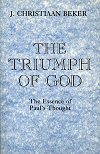
This book posits two pillars as the foundations of Paul’s thought: one, the interaction between coherence and contingency in Paul’s interpretation of the gospel, and two, the apocalyptic character of his Gospel. The author ventures to demonstrate how Paul’s interpretation of the Gospel as coherent is integral with Paul’s communication of the Gospel as situationally contingent. These ostensibly opposing perspectives actually combine to form a fluid Pauline hermeneutic. The centrality of Christological apocalyptic in Paul’s interpretation is posited and involves a radical shift in traditional conceptions of Paul’s theology. The author is “recasting Paul’s theology as a theocentric theology of hope rather than as a Christocentric salvation-history (O. Cullmann) or as an existentialist theology of the cross (R. Bultmann). A theology of hope views the present as the dawn of the future and the future as the full actualization of the present.” Examining the implications of this approach—the ultimacy of God’s sovereignty and triumph beside the Christ-event, the formation of a “biblical-theology,” a rethinking of traditional concepts of salvation and ethics—the author intends to reveal a fresh and most enlightening view of Paul’s theology.
The Triumph of God is a book for which we have long been waiting. In it Beker, one of today’s leading interpreters of Paul, makes available to a wide readership the central tenets of his bold and much-discussed approach to Paul. Beker’s thesis is that, for Paul, the Christ-event is proleptic of the coming, cosmic triumph of God. Categorically, Beker takes issue with any construal of Paul that downplays the theocentric, cosmic, or future aspects of the apostle’s apocalyptic gospel. Challenging and controversial, this slim volume is ideal for classroom use. Pastors, teachers, and students will read it with interest and be nudged to see Paul’s ancient writings in new perspective.
—Jack Dean Kingsbury, emeritus professor, Union Theological Seminary, VA
J. Christiaan Beker was, for 30 years, the Richard J. Dearborn Professor of New Testament Theology at Princeton Theological Seminary; he died in 1999. Among his books are the critically acclaimed Paul the Apostle and The New Testament: A Thematic Introduction.
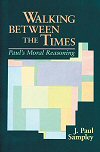
Two times govern Paul’s thought world: the death and resurrection of Jesus, marking the origin of the believer’s life; and Christ’s return or parousia, culminating God’s purposes with this world. Between these two times Paul is concerned about how believers behave—how they walk. J. Paul Sampley provides a guidebook for all who want to understand Paul’s thought world, his moral reasoning, and the resources for deliberation that Paul considers available to believers.
Walking between the Times rescues Paul from his ‘Lutheran captivity’ by emphasizing his eschatology as his frame of ethical reflection. Sampley’s work is one more notable contribution to our reclaiming of Paul for helping Christians to live ‘between the times.’
—Stanley M. Hauerwas, Gilbert T. Rowe Professor of Theological Ethics, Duke University
Sampley offers a clear and easily understood exposition of Paul’s ethic, taking account of a widely accepted consensus about living between the old age and the new. It is the most accessible treatment of the issues currently available and should receive a wide readership.
—Robert Jewett, visiting professor of New Testament, University of Heidelberg
J. Paul Sampley has provided a simple and attractive map of a complicated terrain: Paul’s moral reasoning. Pastors, laypeople, and students will be surprised to discover a fresh way of reflecting on moral issues in texts they thought were all too familiar.
—Wayne A. Meeks, Woolsey Professor Emeritus of Biblical Studies, Yale University
J. Paul Sampley is emeritus professor of New Testament, School of Theology, Boston University.